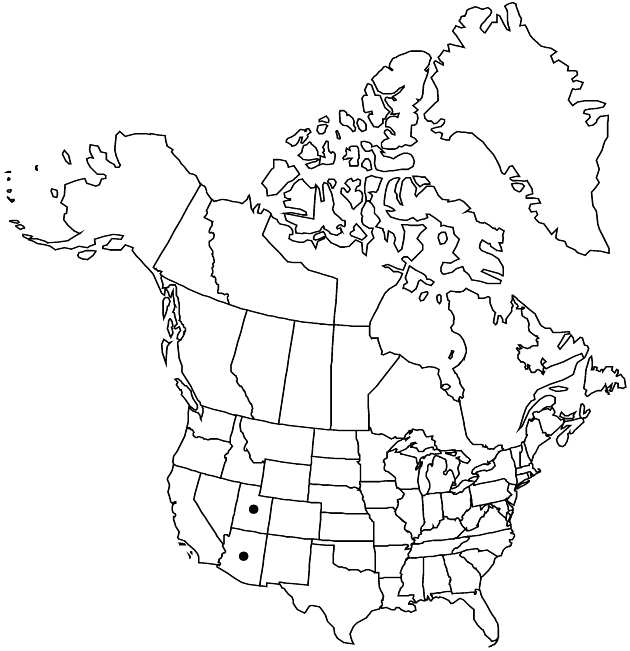Difference between revisions of "Hymenoxys subintegra"
Bull. Torrey Bot. Club 31: 480. 1904.
FNA>Volume Importer |
imported>Volume Importer |
||
| (5 intermediate revisions by 2 users not shown) | |||
| Line 8: | Line 8: | ||
}} | }} | ||
|common_names=Arizona rubberweed | |common_names=Arizona rubberweed | ||
| + | |special_status={{Treatment/ID/Special_status | ||
| + | |code=E | ||
| + | |label=Endemic | ||
| + | }} | ||
|basionyms= | |basionyms= | ||
|synonyms={{Treatment/ID/Synonym | |synonyms={{Treatment/ID/Synonym | ||
|name=Actinea subintegra | |name=Actinea subintegra | ||
|authority=(Cockerell) S. F. Blake | |authority=(Cockerell) S. F. Blake | ||
| + | |rank=species | ||
}} | }} | ||
|hierarchy=Asteraceae;Asteraceae tribe Heliantheae;Asteraceae (tribe Heliantheae) subtribe Gaillardiinae;Hymenoxys;Hymenoxys subintegra | |hierarchy=Asteraceae;Asteraceae tribe Heliantheae;Asteraceae (tribe Heliantheae) subtribe Gaillardiinae;Hymenoxys;Hymenoxys subintegra | ||
| Line 36: | Line 41: | ||
-->{{#Taxon: | -->{{#Taxon: | ||
name=Hymenoxys subintegra | name=Hymenoxys subintegra | ||
| − | |||
|authority=Cockerell | |authority=Cockerell | ||
|rank=species | |rank=species | ||
| Line 50: | Line 54: | ||
|publication title=Bull. Torrey Bot. Club | |publication title=Bull. Torrey Bot. Club | ||
|publication year=1904 | |publication year=1904 | ||
| − | |special status= | + | |special status=Endemic |
| − | |source xml=https:// | + | |source xml=https://bitbucket.org/aafc-mbb/fna-data-curation/src/2e0870ddd59836b60bcf96646a41e87ea5a5943a/coarse_grained_fna_xml/V19-20-21/V21_1105.xml |
|tribe=Asteraceae tribe Heliantheae | |tribe=Asteraceae tribe Heliantheae | ||
|subtribe=Asteraceae (tribe Heliantheae) subtribe Gaillardiinae | |subtribe=Asteraceae (tribe Heliantheae) subtribe Gaillardiinae | ||
Latest revision as of 20:08, 5 November 2020
Biennials or perennials, 30–60 cm (monocarpic; sometimes with sparingly branched, woody caudices). Stems 1(–5), green throughout or sometimes purple-red-tinted proximally, branched distally, usually densely sericeous. Leaves: blades simple or lobed (lobes 3), usually densely sericeous, gland-dotted; mid leaves simple or lobed (lobes 3, terminal lobes 1.8–3.5 mm wide). Heads 10–85+ per plant, in paniculiform to corymbiform arrays. Peduncles 3–9 cm, usually densely sericeous. Involucres hemispheric to campanulate, 8–10 × 10–13 mm. Phyllaries in 2 series, unequal; outer 10–14(–18), basally connate 1/4–1/2 their lengths, lanceolate, obovate, or ovate 5–7 mm, apices acuminate to acute; inner phyllaries 13–16(–22), obovate, 4–5 mm, apices mucronate. Ray florets 10–16; corollas yellow, 10–15 × 4.5–6.5 mm. Disc florets 50–100+; corollas 3.5–4 mm. Cypselae narrowly obpyramidal, 2.1–3 mm; pappi of 5(–6) obovate, aristate scales 2.5–3 mm. 2n = 30.
Phenology: Flowering (Jun–)Jul–Aug(–Sep).
Habitat: Roadsides, open areas, edges of forests
Elevation: 2100–2800 m
Discussion
Hymenoxys subintegra grows mainly on the Kaibab Plateau north of the Grand Canyon in Arizona and in western Kane County, Utah.
Selected References
None.
